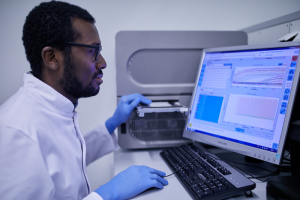Medtech
Omicron’s Origins: How the SARS-CoV-2 Variant Emerged in Africa
This time last year, a new SARS-CoV-2 variant started making headlines. It has been unclear how, when, and where the Omicron variant—which spread at…

This time last year, a new variant of SARS-CoV-2 started making headlines. First discovered a year ago in South Africa, the omicron variant spread across the globe at incredible speed. It has been unclear exactly how, when, and where this virus originated. Now, a new collaboration between researchers in Germany and a network of African institutions shows that Omicron’s predecessors existed on the African continent long before cases were first identified. Their findings suggest that Omicron emerged gradually over several months in different countries across Africa.
The work is published in Science, in the paper, “Gradual emergence followed by exponential spread of the SARS-CoV-2 Omicron variant in Africa.”
The biggest leap seen in the evolution of SARS-CoV-2 to date was observed by researchers a year ago, when a variant was discovered that differed from the genome of the original virus by more than 50 mutations. First detected in a patient in South Africa in mid-November 2021, Omicron BA.1 spread to 87 countries around the world within just a few weeks. By the end of December, it had replaced the previously dominant Delta variant worldwide.

Now, an international research team led by Jan Felix Drexler, MD, group leader at the Institute of Virology at Charité and the German Center for Infection Research (DZIF) developed a PCR test to detect the Omicron variant BA.1. They then tested 13,097 respiratory samples from COVID-19 patients that had been taken in 22 African countries between mid-2021 and early 2022.
In doing so, the research team found viruses with Omicron-specific mutations in 25 people from six different countries who contracted COVID-19 in August and September 2021—two months before the variant was first detected in South Africa.
They then sequenced the viral genome of 670 samples. In doing so, the team discovered several viruses that showed varying degrees of similarity to Omicron, but they were not identical. “Our data show that Omicron had different ancestors that interacted with each other and circulated in Africa, sometimes concurrently, for months,” explained Drexler. “This suggests that the BA.1 Omicron variant evolved gradually, during which time the virus increasingly adapted to existing human immunity.”
In addition, the data led the researchers to conclude that although Omicron did not originate solely in South Africa, it first dominated infection rates there before spreading from south to north across the African continent within only a few weeks.
“This means Omicron’s sudden rise cannot be attributed to a jump from the animal kingdom or the emergence in a single immunocompromised person, although these two scenarios may have also played a role in the evolution of the virus,” said Drexler. “The fact that Omicron caught us by surprise is instead due to the diagnostic blind spot that exists in large parts of Africa, where presumably only a small fraction of SARS-CoV-2 infections are even recorded. Omicron’s gradual evolution was therefore simply overlooked. So it is important that we now significantly strengthen diagnostic surveillance systems on the African continent and in comparable regions of the Global South, while also facilitating global data sharing. Only good data can prevent policymakers from implementing potentially effective containment measures, such as travel restrictions, at the wrong time, which can end up causing more economic and social harm than good.”
The post Omicron’s Origins: How the SARS-CoV-2 Variant Emerged in Africa appeared first on GEN – Genetic Engineering and Biotechnology News.

ETF Talk: AI is ‘Big Generator’
Second nature comes alive Even if you close your eyes We exist through this strange device — Yes, “Big Generator” Artificial intelligence (AI) has…
Apple gets an appeals court win for its Apple Watch
Apple has at least a couple more weeks before it has to worry about another sales ban.
Federal court blocks ban on Apple Watches after Apple appeal
A federal appeals court has temporarily blocked a sweeping import ban on Apple’s latest smartwatches while the patent dispute winds its way through…














